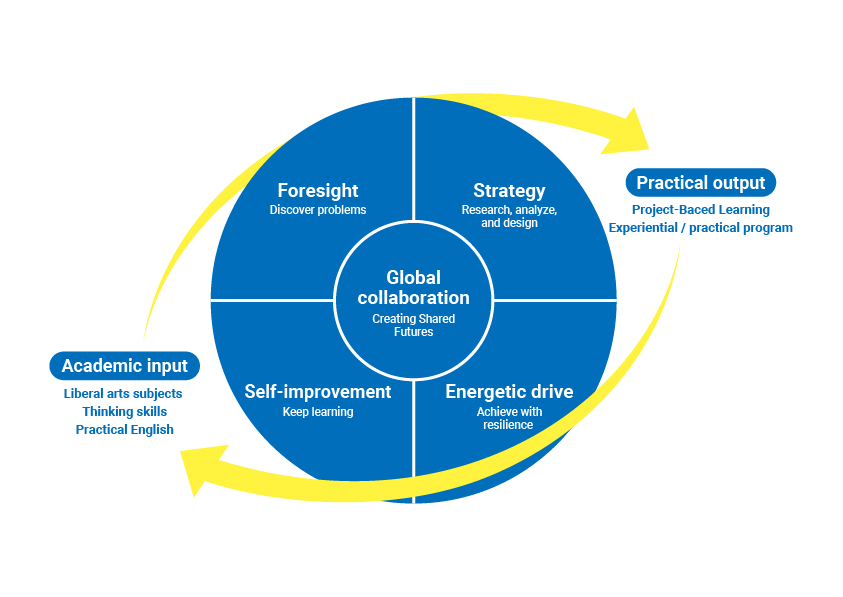Vision and Mission
Aims
Eikei University of Hiroshima aims to foster a cadre of young people by enhancing interdisciplinary skills and knowledge to overlook societies, identify problems, find solutions collaborating with others, and create new values, and contribute locally and globally.
Who We Aim to Foster
Eikei University of Hiroshima aims to foster a cadre of young people who have high aspirations to contribute to local communities and to the world in the midst of uncertain socioeconomic circumstances, as well as to boldly take on unsolved challenges, and to tenaciously pave the way for a new era by offering education that develops 5 competencies (abilities and skills) required to thrive in society.
Our students will enhance the following competencies (abilities and skills)
- The ability to discover problems from a global perspective and strategically create plans for unifying solutions based on a broad education and digital literacy
- Respect for diversities and collaboration with others who have different cultural backgrounds such as culture and values, etc.
- Ability to complete tasks to achieve set goals while taking on challenges with leadership, with a lifelong desire to learn
Diploma Policy
Degree will be conferred to those who have been recognized as obtaining the following competencies (abilities/skills)

| Foresight | The ability to discover the core problems caused by changes in society by developing a multifaceted perspective based on broad knowledge, foreseeing the future with a global perspective and conceptual thinking. |
| Strategy | The ability to develop integrated solutions strategically by collecting, researching and analyzing information and learning with logical thinking utilizing ICT literacy. |
| Global collaboration | The ability to utilize high language proficiency and communication skills for collaborating with people from different cultures and values, respecting social and individual diversity and building credible relationships with them. |
| Energetic drive | The ability to proactively take on and pursue challenges demonstrating leadership and perseverance without avoiding difficulties. |
| Self-improvement | The ability to improve oneself through lifelong learning with high motivation and morality. |
Message from the President
International politics are becoming increasingly confused and are likely to have a major impact on the world economy. As politics and the economy as social infrastructure change dramatically, the development of science and technology, such as generative AI and quantum computers, is progressing at a much faster pace than expected, and it seems that a completely new world is about to be opened up. On the other hand, the impact of the expansion of human activity on the global environment is becoming increasingly apparent, and it is said that an irreversible situation is approaching. Looking at the current situation in Japan, the 2018 prediction of 880,000 18-year-olds in 2040 was the actual number of births in 2024 was less than 700,000. On the other hand, the results of PISA in 2022 show that the performance of 15-year-olds in Japan is among the best in the world. As the birthrate declines, we cannot envision the future of Japan without developing the high potential of Japanese youth and increasing the value created by each individual. It is the mission of higher education to equip young people with the ability and competency to envision a desirable society and realize it, rather than being swept away by a rapidly changing society. It is my dream that young people who have acquired the competency as value through their studies at Eikei University of Hiroshima will lead to realize a new society.

ARINOBU Mutsuhiro
Profile
He earned his Ph.D. in 1976 at the University of Tokyo Graduate School of Engineering (Doctor of Engineering). After serving as head of the Research and Development center as well as Executive Director at Toshiba Corporation (Former Tokyo Shibaura Electric Company), he became Executive Director at Yokohama National University in 2009, auditor at the University of Tokyo in 2010, and then Executive Director of the Institute of RIKEN in 2014. He then became Executive Director and Vice President of the University of Tokyo in April 2018 (until March 2021). He has also served as a member of the Ministry of Education, Culture, Sports, Science and Technology’s Central Council for Education, the working group chairperson for the graduate school working group of that Council, member of the future design working group within the universities subdivision of that Council, advisor for the Japan Accreditation Board for Engineering Education (JABEE), and more.

